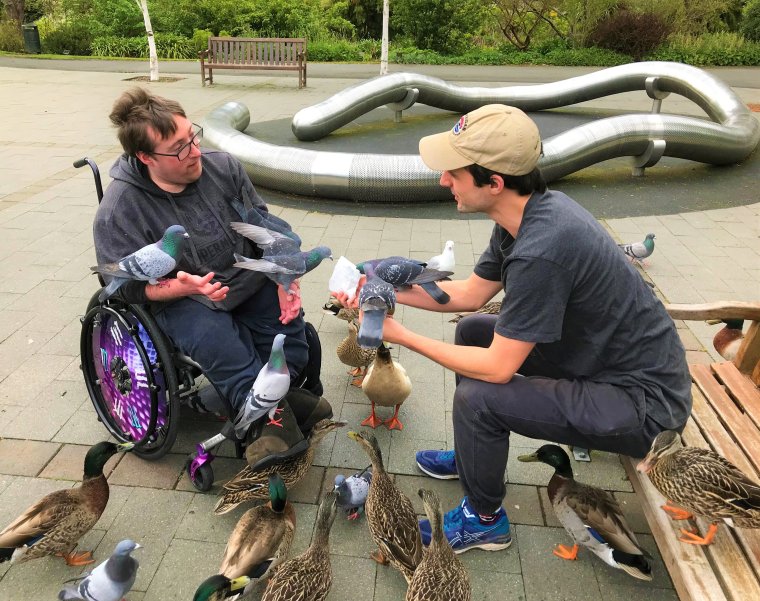Member Spotlight

April 2021
IHC
Photo supplied by IHC; story written by Angela Reid, Marketing Volunteer
“Everyone has a gift for something, even if it is the gift of being a good friend.”
― Marian Anderson, American singer
People volunteering with IHC’s Volunteer Friendship Programme aren’t just giving and receiving the gift of friendship, they’re demonstrating the power of inclusion in their community.
IHC provides services, support and advocacy for people with intellectual disabilities and their families.
The organisation’s friendship programme (VFP) involves a one-to-one relationship between a person IHC supports and a volunteer friend. The pair choose how they’ll spend their time together and the idea is that the volunteer will keep doing activities they already do – they’ll just include their friend and be out in the community having fun together.
“Generally what they [the volunteers] get out of it are fun experiences,” says IHC’s Dunedin volunteer co-ordinator Dean Reed, “because it’s not like work particularly. It’s going out and doing stuff that they would probably be doing anyway. They’d probably go for a walk down the beach or something once a week – and why not take someone along with them and have a chat along the way?”
Dean is the first point of contact for new volunteers. He’ll get to know them through informal chats and an interview before playing matchmaker, pairing them with someone who has similar interests or goals.
“Or maybe people are just completely open-minded and want to spread their wings and learn things. And they can learn from each other.”
Once matched, the friends work with Dean on a “description of activities” which guides what they’ll do together. For example, one pair might agree to go for a swim at Moana Pool every Friday morning, another pair might plan to go to the beach on a fine day but if the weather’s bad they might go out for a coffee or lunch instead.
While there’s an activity plan, contact times are flexible: how long and how often friends come together varies depending on their schedules, activities and opportunities.
Ideally the activities will be free but where there are costs involved, such as the price of a movie ticket, IHC ensures the person they support is able to afford it. IHC will also reimburse the volunteer for out-of-pocket expenses.
Whatever the friends settle on doing, they’re encouraged to get out of the house and into the community, to participate in local events and visit local places. Dean keeps volunteers informed about free or low-cost community events, through his monthly email bulletin.
This community aspect is key to the friendship programme, which Dean says makes an important link between Dunedin’s community of people living with disabilities and the wider community.
The principle of a more inclusive community is the ethos behind the programme, he says. While people may think they’re already inclusive, when they start engaging in a disability-related world “then they really start to expand their minds as to what inclusivity is.”
Dean says the VFP’s an ideal opportunity for people to expand their horizons by gaining experience with people who have intellectual disabilities, and volunteers who may feel apprenhensive to begin with will be amazed by how their confidence grows.
Through their involvement in the disability sector, the volunteers are making an invaluable contribution to their community. Dean says these friendships are very special for the people IHC supports because it gives them a friend that’s just for them. While there are many activities available for IHC-supported people, they tend to be group oriented, so the one-to-one nature of a VFP friendship is important because it means someone can really get to know them.
“Most of the time they’re surrounded by family and support workers that either have to be there or are paid. And so this programme offers opportunities for people that really want to be there, that aren’t getting paid, who are interested in genuine friendships and achieving genuine goals, and doing it out in the community.”
While some volunteers come to the programme with experience or skills in interacting with people with disabilities, knowledge of intellectual disabilities is not a prerequisite for joining the programme. Volunteers go through an induction and orientation which covers getting to know IHC, understanding intellectual disability, communication and health and safety. They’ll also have access to IHC’s library as well as specialist training on their friend’s specific disability. And if any challenges or issues pop up during the friendship, IHC will be there to help the volunteer overcome the hurdle.
IHC’s ongoing support and training isn’t the only opportunity volunteers have to make connections beyond the one-to-one friendship.
“We do come together a few times a year as a group, which is a nice occasion as well because people can share ideas off each other and feel they’re part of something bigger ― they’re part of a bigger IHC family.”
- If you’d like to volunteer for IHC’s Volunteer Friendship Programme (or any of the other IHC volunteer programmes listed below), go to https://volunteersouth.org.nz/organisation-profile/1182-ihc
- IHC welcomes volunteers for these programmes too:
- Skills-based Volunteering: This extension of the friendship programme involves focusing on shorter projects aimed at achieving a specific goal or developing a certain skill.
- i-Volunteering: This one-to-one programme connects people with intellectual disabilities and family carers with a friend through online or phone communication.
- Administration Volunteering: These volunteers provide administrative support for a Volunteer Co-ordinator to help them deliver a successful community programme.